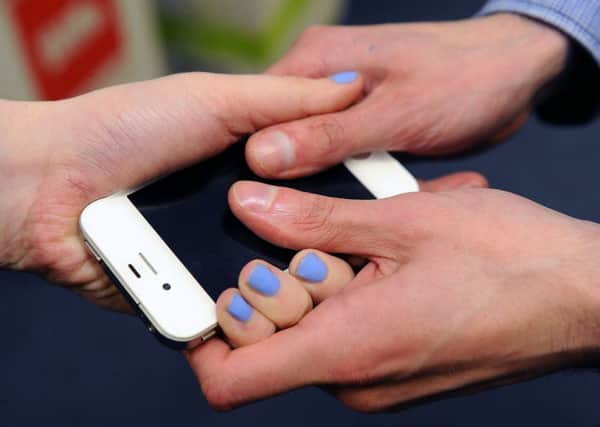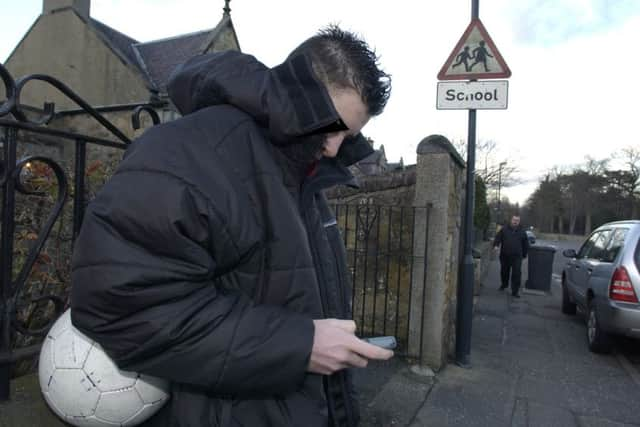Stuart Allardyce: Youngsters sexting '˜should not be a crime'


Internet dating seems increasingly commonplace nowadays and hardly worth commenting on.
And I wonder how many readers of this blog would privately admit to having flirted with someone online? Emails, texts, social networking, communication via apps.
Advertisement
Hide AdAdvertisement
Hide AdIf new technologies have revolutionised so many aspects of our lives, they are also subtly involved with aspects of our most intimate and personal relationships as well.


In a measured piece on the Today programme on (on BBC) a 14-year-old and his mother were interviewed.
He talked about sending a nude selfie of himself via Snapchat to a female school friend which was then shared by the friend to others in the school.
He was interviewed by the police in relation to distribution of an indecent image of a child but was then not charged.
Although the decision not to charge him was enlightened, his mother was informed by the police that details of the incident may come to light if he ever applies for a job that required the equivalent of an enhanced disclosure check. Accordingly he was advised never to work with children.


I know nothing about this case beyond the media story.
However, I know that in our Barnardo’s services across Scotland we see a lot of young people getting into trouble because of this kind of behaviour.
In one morning recently I was told about three such cases. In each of the situations the complaint to the police was not made by the young person who received the image, but by the parent who intercepted it. All of the young people were charged.
Let me try and make my position very clear here.
Young people sending sexual images to each other is never a good idea.
Advertisement
Hide AdAdvertisement
Hide AdIt sometimes happens in a context of coercion or peer pressure. Even if that hasn’t happened, the image is no longer in the control of the child and can be shared at a later stage with peers.
Some images end up in the hands of adult sexual offenders. At best such situations usually lead to embarrassment and shame for young people but the outcomes can often be a lot worse.
However, I’m not convinced that such situations always need to be criminalised. We know from research recently undertaken at University of Edinburgh interviewing adolescents about their use of nude ‘selfies’ and ‘sexting’ that this behaviour is relatively commonplace.
And the meanings of the behaviours are various: for other young people sexting practices may be abusive behaviour, a form of sexual harassment or a ‘marker of further risk’.
But for some young people, self-producing images are a means of flirting and teenage experimentation, or a way of enhancing a relationship that is sexual or on the way to being sexual.
That sounds to me a lot like how adults use new technologies in intimate ways. And that’s not surprising: young people don’t become sexual beings the day of their 16th birthday. With young people always now online in some way or other, it is inevitable they will experiment sexually online. Harm reduction needs to be the perspective we take here.
Day in and day out Barnardo’s services in Scotland work with children and young people who have been sexually abused and exploited.
Because we are committed to preventing sexual abuse we also work with children who display harmful sexual behaviour. We need to name abuse when we see it. We also need to respond to sexual experimentation – and genuine mistakes - sensitively and appropriately.
Advertisement
Hide AdAdvertisement
Hide AdWe need to engage with and support parents about how they can promote an idea of healthy and respectful relationships for their children. Sometimes we will need to respond in a pro-active way to protect children. And we need to stop criminalising children for sexual offences - with the life-long consequences for career choices this involves – when they have made stupid mistakes.
So let’s get our act together. At present we see different kinds of police decisions across Scotland with these kinds of situations.
We have no agreed guidance for schools on how to respond to ‘sexting’. But above all else, as adults we need to hold onto what it’s like to be a 14-year-old starting to think about and explore intimate relationships for the first time, and appreciate what that must be like doing this in an online world where communication is immediate and actions are difficult to reverse.
Safer Internet Day 2016 takes place on 9 February.
The Safer Internet Centre has produced lots of resources to support Safer Internet Day.
Those working with children should check out the links to get ideas about what they can do. For example, there’s a series of videos for SID TV, aimed at under 11s and for 11 to 18-year-olds. These films focus on how young people can play their part for a better internet and are designed to work alongside the activities within the Safer Internet Day Education Packs.
You can also visit the Safer Internet Day website for all the information and available downloads: http://www.saferinternet.org.uk/safer-internet-day/2016 and get involved in the #shareaheart social media campaign to help inspire kindness online.
Stuart Allardyce is a Children’s Service Manager at Barnardo’s Skylight / Lighthouse which works with children and young people affected by sexual abuse and exploitation